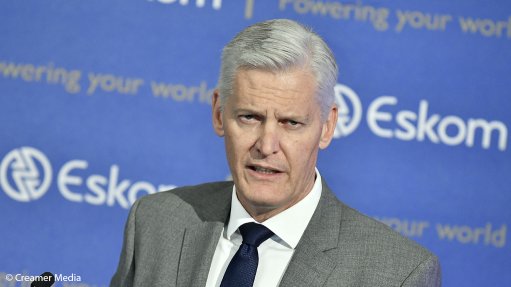
Eskom CEO André de Ruyter
Photo by: Donna Slater
Eskom CEO André de Ruyter has got the support of yet another leader in government after deputy president David Mabuza told Parliament that while the power utility was dogged with challenges, the Eskom boss was best placed to help the entity recover.
Mabuza was replying to questions orally in a hybrid plenary of the National Council of Provinces in Parliament on Thursday afternoon. The plenary took place a week after Eskom plunged the country into Stage 4 load-shedding and a day after the utility implemented Stage 2 load-shedding.
The return of load-shedding prompted some opposition parties and representatives of organised labour to call for De Ruyter's removal, to which the Eskom CEO responded that he would not be leaving the entity of his own accord - likening the criticism to changing jockeys on a dead horse.
Minister of Public Enterprises Pravin Gordhan, too, gave the Eskom CEO his vote of confidence during his own oral replies at the National Assembly on Wednesday afternoon - but added that he apologised for the remark.
'Another panel will not help'
While he enjoys support from government heavyweights, however, De Ruyter has presided over the highest volumes of load shedding on record.
On Thursday afternoon, Mabuza was replying to a question by ANC member of Parliament Theledi Matibe, who asked whether government considered a structure or committee of experts to assist Eskom to develop interventions to address load-shedding.
Mabuza said the government task team on Eskom, which he chairs as leader of government business, and the Presidential State-Owned Entity (SOE) Council, were sufficient to address the challenges dogging Eskom and other parastatals on an advisory level.
"The challenges at Eskom have not been with the quality of plans, but resources, services and funding required to meet the needs of power generation. It is there for our view that another panel will not help the situation, but Eskom urged to look at weaknesses that affect performance," said Mabuza.
Mabuza said Eskom management was looking at "intensive" maintenance of its fleet to avoid breakdowns that often cause outages.
In a supplementary question to the deputy president, EFF MP Fani Mathebula brought up de Ruyter's "dead horse" remark. Mathebula asked Mabuza if he agreed that Eskom was a "dead horse" and if he had any confidence left in De Ruyter's leadership.
"If the member wants my opinion as an individual, I can tell you that in the person of a CEO, you have a very good manager. But remember, you brought him into something that was already ailing, unstable and collapsing.
"You can say that load-shedding has occurred, but he must be commended on the work done. But as a country we are saying that we can't live like this forever," Mabuza replied.
He said Eskom's debt of more than R400-billion was the subject of a report which would reach the desk of President Cyril Ramaphosa soon.
"Eskom is not a dead horse. Eskom is alive, that is why we have energy. We are addressing the energy gaps evidenced by some of the interruptions," he added.
Mabuza said the fact that load-shedding could be implemented across South Africa on short notice indicated that Eskom must replace ageing plants.
He said while the 2 500 MW from bidding window 5 of the Renewable Energy Independent Power Producers Procurement Programme could help alleviate pressure, the energy it brings to the grid was likely to fluctuate and was unstable.
Asked about saboteurs within the ranks of former Eskom employees, Mabuza expressed confidence that anyone undermining South Africa's power supply through illegal means would be brought to book.
"The Presidential SOE Council with all its work streams is dealing with all of these problems. One is looking at effective operations to eliminate implications and another that looks at financial stability. The final report to the president will have recommendations that speak to all of these issues," said Mabuza.
He said maintenance challenges were linked to resources and procurement and that government was developing solutions to drive down the cost of equipment and spare parts for Eskom in emergencies.